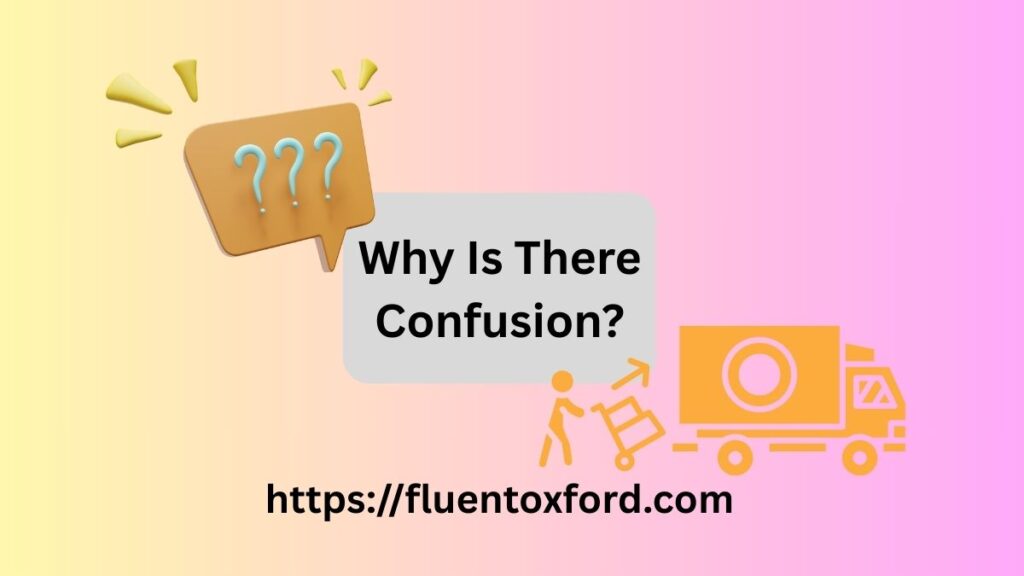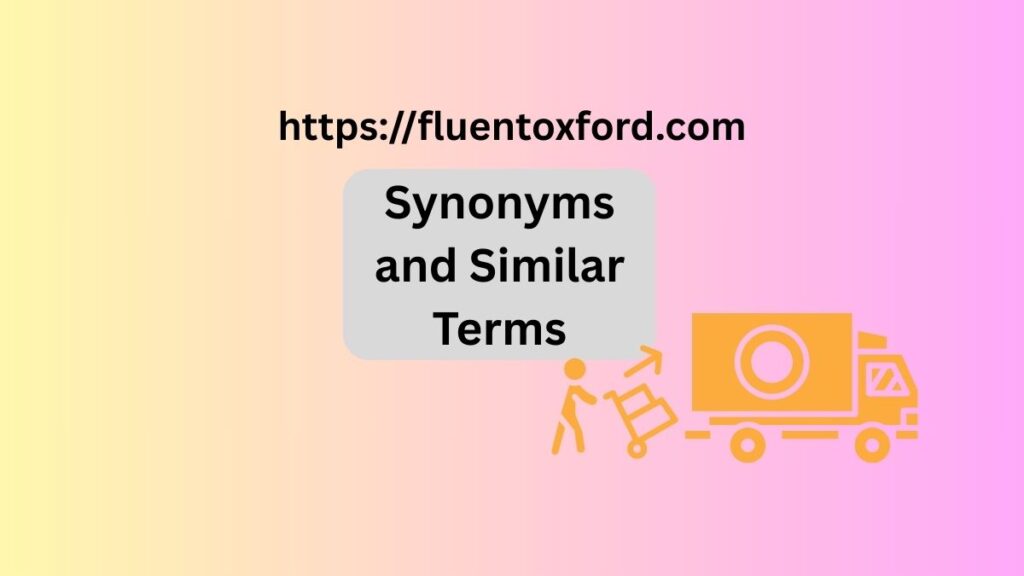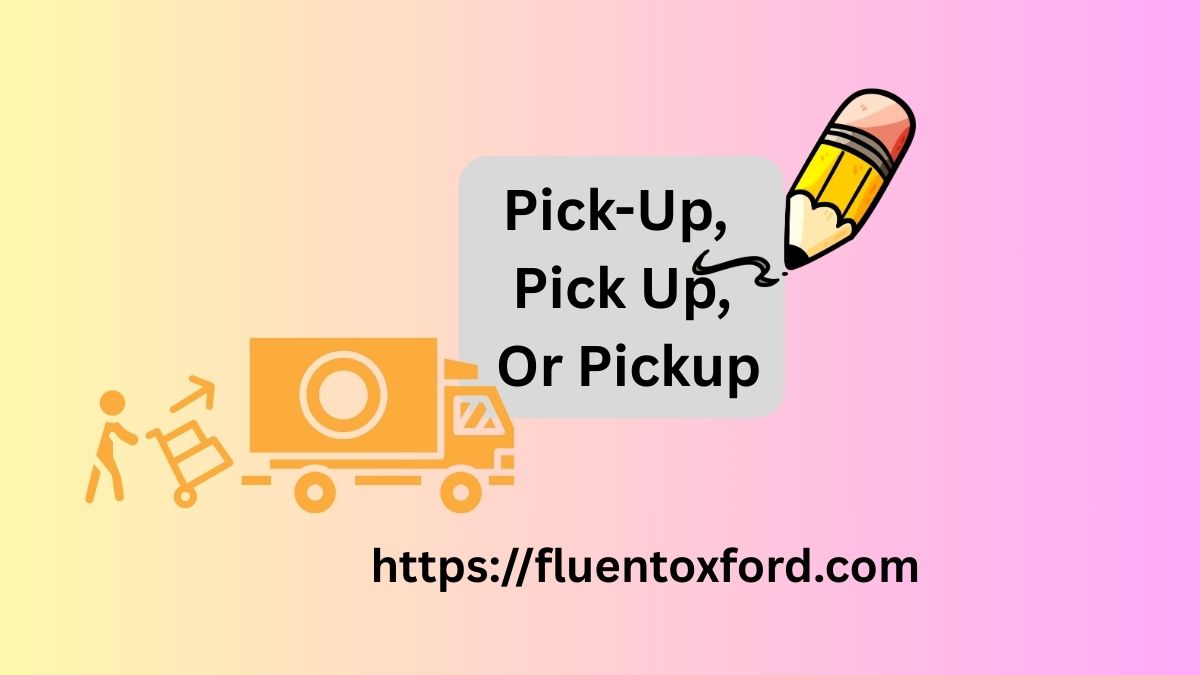The phrase “Pick-Up, Pick Up, or Pickup” refers to the different ways this term is used in English, each with its own meaning and grammatical function. “Pick up” is a verb phrase, typically meaning to lift, collect, or improve something. “Pickup,” as a single word, is a noun often associated with vehicles, casual sports games, or acts of collecting something. “Pick-up,” with a hyphen, is used as an adjective or noun in specific contexts, such as “pick-up service” or “pick-up line.” Understanding the correct usage of these variations is essential for clear and effective communication.
Many people unknowingly mix up these terms, leading to confusion in both writing and speech. A simple shift in spelling can change the meaning of a sentence entirely. Imagine writing “I need a pickup” when you mean “I need to pick up my order”—the difference is subtle but significant. Knowing when to use each form correctly not only improves grammar but also enhances clarity and professionalism in communication.
Mastering the correct usage of “Pick-Up, Pick Up, or Pickup” is more than just a grammar lesson—it’s a way to refine your language skills. Whether you’re drafting a business email, writing a blog, or simply having a conversation, choosing the right form ensures your message is precise. By understanding the distinctions, you can avoid miscommunication and express yourself more effectively in both casual and formal settings.
Why Is There Confusion?

The confusion around “pick-up,” “pick up,” and “pickup” comes from the way English evolves. Some words start as separate phrases and gradually merge into compound words. Others retain distinct meanings even though they sound identical.
The confusion between “Pick-Up,” “Pick Up,” and “Pickup” comes from their similar spelling and related meanings. Since all three forms stem from the same root verb, people often assume they are interchangeable. However, their grammatical roles differ.
The phrase “pick up” is a verb, while “pickup” is a noun, and “pick-up” is an older hyphenated form sometimes used as an adjective. Changes in English spelling trends have also contributed to the confusion, as hyphenated words have gradually been simplified. Understanding these differences helps avoid mistakes in both writing and speech, ensuring clearer and more effective communication.
Here’s why these terms create uncertainty:
- Multiple grammatical roles – Depending on the context, the phrase functions as a verb, noun, or adjective.
- Changes in spelling conventions – Language shifts over time, and common usage can dictate preferred forms.
- Influence from compound words – Many words, like “setup” and “set up,” follow similar patterns, leading to uncertainty.
Definitions and Correct Usage of Each Term
To improve writing, it’s crucial to know how each variation functions in different contexts.
Pick-Up (Hyphenated)
Definition:
“Pick-up” is typically used as an adjective or a noun to describe something related to gathering, collecting, or improving.
Correct Usage:
- As an adjective, “pick-up” describes something related to collection or improvement.
- As a noun, it refers to an act of gathering items, increasing speed, or taking possession of something.
Examples:
✅ The restaurant offers pick-up orders for online customers. (Adjective)
✅ She arranged a pick-up at the airport for her guests. (Noun)
✅ The team noticed a pick-up in performance after training. (Noun: improvement)
Pick Up (Two Words)
Definition:
“Pick up” is a verb phrase that describes an action of lifting, gathering, collecting, or improving something.
Correct Usage:
- Used when referring to an action (verb).
- Can be applied to physical lifting, transportation, speed, or improvement.
Examples:
✅ Can you pick up the groceries on your way home? (Action: collecting items)
✅ The taxi will pick up passengers at the hotel. (Action: gathering people)
✅ Sales pick up during the holiday season. (Action: improving)
Pickup (One Word, No Hyphen)
Definition:
“Pickup” is commonly used as a noun to refer to an object or concept, including a pickup truck, a scheduled collection, or a boost in activity.
Correct Usage:
- Used as a noun to describe a thing or event.
- Commonly found in business, transportation, and sports contexts.
Examples:
✅ He drives a pickup truck to work. (Noun: type of vehicle)
✅ The courier scheduled a pickup for the package. (Noun: collection event)
✅ The company noticed a pickup in sales after launching a new product. (Noun: increase)
Which One Should You Use? (Quick Reference Guide)
| Word/Phrase | Part of Speech | Usage Example |
| Pick-Up (Hyphenated) | Adjective/Noun | “She requested a pick-up service at the airport.” (Noun) |
| Pick Up (Two Words) | Verb Phrase | “Can you pick up some coffee on your way home?” (Verb) |
| Pickup (One Word) | Noun | “He bought a brand-new pickup truck for off-roading.” (Noun) |
Use this table to quickly determine the correct usage based on the sentence structure.
Examples in Real-World Contexts
- Business & Logistics: “The store provides scheduled pick-ups for large items.”
- Casual Conversation: “I’ll pick up dinner on my way home.”
- Automotive Industry: “The Ford F-150 is one of the most popular pickup trucks in the U.S.”
- Sports & Fitness: “There was a noticeable pick-up in his speed during the final lap.”
Real-world examples help reinforce the correct usage of each variation.
Synonyms and Similar Terms

For “Pickup” or “Pick-Up” (Noun & Adjective Forms)
- Collection
- Retrieval
- Boost
- Delivery
For “Pick Up” (Verb Phrase)
- Gather
- Lift
- Retrieve
- Collect
Using synonym and terms properly enhances clarity and variety in writing.
Origins and Etymology of the Terms
The terms “Pick-Up,” “Pick Up,” and “Pickup” have evolved over time, originating from the verb “pick”, which comes from Middle English and Old English words meaning “to choose” or “to gather.” The phrase “pick up” emerged in the 16th century as a phrasal verb meaning “to lift” or “to collect.” Over time, its usage expanded to include meanings like improving skills, gathering speed, or resuming activities.
The noun “pickup” appeared in the early 20th century, referring to things collected or small trucks designed for carrying loads. The hyphenated “pick-up” was commonly used before English spelling evolved to prefer compound words without hyphens. Today, these variations continue to reflect different meanings in modern English.
History of “Pickup” or “Pick-Up”
- First recorded use in the early 20th century.
- Derived from the verb phrase “pick up” but solidified into a noun definition.
- Commonly associated with transportation (pickup trucks) and commerce (scheduled pick-ups).
History of “Pick Up”
- Dates back to Middle English.
- “Pick” comes from Old English “pikken,” meaning “to seize or grasp.”
- “Up” was added as a collocation to indicate movement or collection.
Understanding the origin of terms provides insight into their evolution and dictionary meaning.
Common Mistakes and Misconceptions
A common mistake is using “pickup” as a verb instead of “pick up” (e.g., I will pickup my order instead of I will pick up my order). Another misconception is overusing “pick-up”, which is now mostly outdated. Choosing the right form ensures clarity and correct grammar in writing.
❌ Incorrect: “I’ll pickup the package later.” (Wrong usage of “pickup” as a verb)
✅ Correct: “I’ll pick up the package later.” (Verb phrase required)
❌ Incorrect: “The taxi driver scheduled a pick up.” (Should be “pick-up” or “pickup”)
✅ Correct: “The taxi driver scheduled a pickup.” (Noun form required)
Avoid these common mistakes to improve writing and ensure clarity.
Conclusion
Understanding Pick-Up, Pick Up Or Pickup: What’s The Correct Usage? helps you write and speak more clearly. Each form has a different meaning, and using the wrong one can create confusion. “Pick up” is a verb, “pickup” is a noun, and “pick-up” is usually an adjective. Learning these differences makes your writing more professional and easier to understand.
Mastering Pick-Up, Pick Up Or Pickup: What’s The Correct Usage? improves your communication skills. Whether you are writing a message, a report, or a social media post, choosing the right form ensures clarity. Small grammar details can make a big impact on how your words are understood. By using the correct form, you show attention to detail and confidence in your language.
FAQs
1. What is the difference between “pickup,” “pick-up,” and “pick up”?
- “Pick up” is a verb phrase for an action (e.g., “Can you pick up the groceries?”).
- “Pickup” is a noun referring to a thing or event (e.g., “The store offers package pickup.”).
- “Pick-up” is sometimes used as an adjective but is less common today (e.g., “She arranged a pick-up service.”).
2. Is “pickup” one word or two?
- It depends on context. “Pickup” (one word) is a noun (e.g., “He drives a pickup truck”), while “pick up” (two words) is always a verb phrase (e.g., “I will pick up my order”).
3. When should I use “pickup” instead of “pick up”?
- Use “pickup” when referring to a thing or an event (e.g., “The company scheduled a pickup”).
- Use “pick up” when describing an action (e.g., “Please pick up your package”).
4. Can “pickup” be used as an adjective?
- While some style guides accept “pick-up” as an adjective, modern usage favors “pickup” as a noun or “pick up” as a verb phrase.
5. What are some common synonyms for “pick up” and “pickup”?
- For “pick up” (verb phrase): collect, gather, retrieve, lift.
For “pickup” (noun): collection, retrieval, boost, delivery.

As an admin at Fluent Oxford, Maida Queen is the driving force behind our vibrant learning community. With a deep passion for English language education, she ensures that our platform remains a dynamic, engaging, and supportive space for learners worldwide.
Maida expertly manages content, assists users with their grammar and fluency queries, and fosters an interactive environment where learning feels effortless and enjoyable. Whether you need guidance, motivation, or just a friendly face in the Fluent Oxford community, Maida is always there to help you reach your English language goals.








